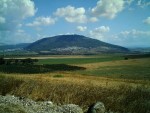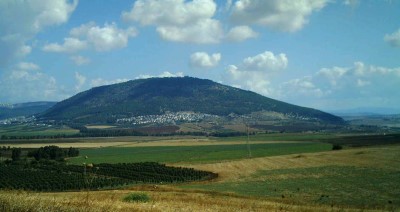 撒母耳记上第五课:撒母耳记上第十五章:
撒母耳记上第五课:撒母耳记上第十五章:
扫罗王违背神;神拒绝扫罗为王
一。撒母耳给扫罗什么使命?
二。 当以色列人从埃及出来时,亚玛力人怎样待以色列人,怎样抵挡他们?(请参阅:出埃及记17:8-16;民数记14:43-45;申命记25:17-19。)
三。 请解释清楚耶和华神怎么能够向扫罗说:“你要去击打亚玛力人,灭尽他们所有的,不可怜惜他们,将男女、孩童、吃奶的,并牛、羊、骆驼和驴尽行杀死”。如果“神就是爱”(约翰壹书4:8),神怎么能够叫以色列人如此行?请注意:1)神是天地的大主宰。虽然有一些现代人觉得此命令是不可思议的,但是神既是圣洁的,他又不会犯罪。他所有的命令是对的,是公议公义的。2)当审判日,亚玛力人要灭亡。藉着扫罗和以色列人的手,神让亚玛力人早一点接受审判。3)以色列人是神的“工具”,实行审判。4)亚玛力人的孩童长大后,只会跟长辈一样—犯罪。5)神已经给亚玛力人数百年悔改的机会。彼得后书三章9节庄严声明,主“不愿有一人沉沦,乃愿人人都悔改”。
四。 7-9节:扫罗是否听从神的命令?扫罗怎么样试着自白?
五。 9节:“扫罗和百姓却怜惜亚甲,也爱惜上好的牛、羊、牛犊、羊羔并一切美物,不肯灭绝;凡下贱瘦弱的,尽都杀了” 。由第九节可知,扫罗的态度如何?
六。 请用自己的话形容扫罗的错是什么。
七。 10-11节:神对扫罗的反应是什么?“我立扫罗为王,我后___了,因为他___去不跟从我,不遵___我的命令。撒母耳便甚忧___,终___哀求耶和华”。(请参看35节。)
八。 12节:撒母耳发现扫罗已去迦密作什么? 请注意新译本的翻译:“扫罗到了迦密,在那里为自己立了一座纪念碑…”由第十二节可知,扫罗的态度如何?
九。 13-23节:在撒母耳记上,此段话非常重要。请多读几次,多思考。

十。 13节:请分别清楚撒母耳和扫罗二人各个的对“执行神的命令”一词的定义有所不同的看法。(注意:“执行神的命令”一词是新译本的翻译。和合本翻译为“耶和华的命令我已遵守了”。)
十一。 请背诵撒母耳向扫罗的责难:“耶和华喜悦燔祭和平安祭,岂如喜悦人___从他的话呢?听命___于献祭;顺从胜于公羊的脂油。悖逆的___与行邪术的罪相等;顽梗的罪与拜___神和偶象的罪相同。你既厌弃耶和华的命___,耶和华也厌弃你作___”。
十二。24-31节:扫罗请求撒母耳做什么?“现在求你赦免我的罪,同我___ ___,我好敬拜耶和华”。撒母耳是否立刻就如此行?最后,撒母耳是否就如此行?
十三。28节:撒母耳对扫罗说:“如此,今日耶和华使以色列国与你断绝,将这国赐与比你更好的人”。撒母耳指谁而言——谁比扫罗更好?
十四。29节:此句话值得我们背诵:“以色列的___ ___者必不至说___,也不至后___。因为他迥非世人,决不后悔”。(新译本的翻译:“以色列的大能者必不说谎,也不后悔。因为他不是世人,他决不后悔”。普通话本的翻译比较清楚:“主是以色列的荣耀,他言出必行,不会改变主意;他不是没有主观的世人”。)
十五。32-33节:亚玛力王名字是___ ___。看起来,他以为他不会____。撒母耳向他说的又是一句名言:“‘你既用刀使妇人___ ___,这样,你母亲在妇人中也必___ ___。’于是,撒母耳在吉甲耶和华面前将亚甲杀死”。此事应该是谁做的?
十六。请再次阅读11节、29节及35下半节。11节和35节告诉我们说,“神后悔了”,但是第29节说“神不后悔”。这两句话是否矛盾? 为什么?注意:现代中文译本把这几句话翻译如下:11节:“我后悔立扫罗作王;他已经离弃我,违背了我的命令。”撒母耳很不高兴,整晚向上主恳求。29节:“以色列的大能者——上帝不说谎,也不改变主意;他不是世人,他不改变主意。”35节:“从那时一直到死,撒母耳没有再看过扫罗,但是他为扫罗悲伤。上主后悔立扫罗作以色列的王。”神的心里感到难过。扫罗有很多机会做一位好王,但是他自己拒绝了神,错过了良机。
读者:欢迎您把这篇短文下载,复印,用在您的《圣经》班里。
图片:以色列国的他泊山。扫罗王时常经过或爬上他泊山。Photo: Mount Tabor in Israel. King Saul frequently passed by or climbed Mt. Tabor. Photo ©Edward Short.
Bible Study Questions: 1 Samuel Lesson Five
1 Samuel 15: Saul Disobeys God; God Rejects Saul
1. On what mission did Samuel send Saul?
2. How did the Amalekites treat the Israelites when Israel left Egypt? (See Exodus 17:8-16; Numbers 14:43-45; Deuteronomy 25:17-19.)
3. Explain how the Lord God was able to tell Saul to “…go and attack Amalek, and utterly destroy all that they have; do not spare them, but kill both man and woman, child and infant, ox and sheep, camel and donkey” (NRSV). If “God is love” (1 John 4:8), how was God able to tell Israel to do this thing? Please note: 1) God is the Sovereign of all of heaven and earth. Although some people today consider this command to be beyond comprehension, God is holy and he cannot sin. All of his commands are true and righteous. 2) The Amalekites would be destroyed on the day of judgment. God judges them early, via the hand of Saul and the Israelites. 3) The Israelites are God’s “tool” to achieve judgment. 4) When the children of the Amalekites would grow up, they would be exactly like their predecessors—sinful. 5) God had already given the Amalekites several hundred years of opportunity to repent. 2 Peter 3:9 affirms that the Lord is “not wanting any to perish, but all to come to repentance” (NRSV).
4. Vs. 7-9: Did Saul obey God’s command? How did Saul try to vindicate himself?
5. Vs. 9: “Saul and the people spared Agag, and the best of the sheep and of the cattle and of the fatlings, and the lambs, and all that was valuable, and would not utterly destroy them; all that was despised and worthless they utterly destroyed” (NRSV). What does verse nine tell us about Saul’s attitude?
6. Explain in your own words what Saul’s error was.
7. Vs. 10-11: What was God’s reaction to Saul? “I r___ that I made Saul king, for he has t___ back from following me, and has not c___ out my commands. Samuel was a___; and he cried out to the LORD all n___” (NRSV). (See v. 35 also.)
8. Vs. 12: Samuel found out that Saul had gone Carmel to do what? [The New Chinese Translation is also quoted; this translation makes clear that the monument was for Saul himself, whereas the Union Version does not.] What do we learn about Saul’s attitude from verse twelve?
9. Vs. 13-23: This is a very important section in 1 Samuel. Read it several times and give it serious thought.
10. Vs. 13: Differentiate clearly how Samuel and Saul each interpret the phrase “carried out the command of the LORD.” [Again, two Chinese translations are given.]
11. Memorize how Samuel censured Saul: “”Has the LORD as great delight in burnt offerings and sacrifices, as in o___ to the voice of the LORD? Surely, to obey is b___ than sacrifice, and to heed than the fat of rams. For rebellion is no less a s___ than divination, and stubbornness is like i___ and idolatry. Because you have rejected the w___ of the LORD, he has also rejected you from being k___” (NRSV).
12. Vs. 24-31: What did Saul ask Samuel to do? “Now therefore, I pray, pardon my sin, and r___ with me, so that I may worship the LORD” (NRSV). Did Samuel comply immediately? Did Samuel comply eventually?
13. Vs. 28: Samuel told Saul, “The LORD has torn the kingdom of Israel from you this very day, and has given it to a neighbor of yours, who is better than you” (NRSV). To whom did Samuel refer?
14. Vs. 29: It is worth our effort to memorize this statement: “Moreover the G___ of Israel will not r___ or c___ his mind; for he is not a mortal, that he should change his mind” (NRSV). [Three Chinese translations are given: Union Version, New Version and Putonghua Easy-to-Read Version.]
15. Vs. 32-33: What was the name of the king of the Amalekites? It seems that he thought what would not happen to him? What Samuel said to him is another famous statement: “‘As your sword has made women c___, so your mother shall be c___ among women.’ And Samuel hewed Agag in pieces before the LORD in Gilgal” (NRSV). Who should have done this?
16. Read again verses 11, 29 and 35. Verses 11 and 35 tell us that God “regretted/repented,” but verse 29 says that “God does not regret/repent.” Are these statements contradictions? Why? Note: These verses are quoted from the Today’s Chinese Version. God gave Saul many opportunities to be a good king, but Saul rejected God.
圣经问答
撒母耳记上第五课:
扫罗王违背神;神拒绝扫罗为王
Bible Study Questions: 1 Samuel Lesson Five
1 Samuel 15
Saul Disobeys God; God Rejects Saul
作者:谢德华 ©By Edward Short
本文所问的问题使用汉子圣经。
欢迎您把此文下载用在圣经班或私人学习。
A series of Bible lessons, written in Chinese
and based largely on the text of the Chinese Bible.
You may download and print copies of this lesson
for use in your Bible class.
